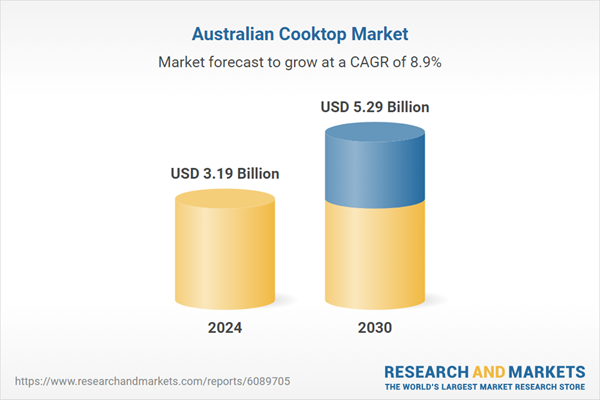Speak directly to the analyst to clarify any post sales queries you may have.
10% Free customizationThis report comes with 10% free customization, enabling you to add data that meets your specific business needs.
This shift is further reinforced by government incentives and a growing movement toward all-electric homes. Smart kitchen technologies and compact, multifunctional appliances are also gaining momentum, particularly in urban settings. Brands such as Electrolux, Fisher & Paykel, and Smeg are leading innovation with smart, connected cooktops tailored to evolving lifestyle needs. As urbanization and environmental awareness continue to rise, the market is poised for sustained growth, reflecting the demand for modern, efficient, and sustainable cooking solutions.
Key Market Drivers
Rising Adoption of Energy-Efficient and Sustainable Appliances
The surge in demand for energy-efficient and eco-conscious appliances is a key driver of growth in the Australian cooktop market. In line with Australia’s climate commitments, consumers are increasingly opting for appliances that promote lower energy use and reduced carbon emissions. Induction cooktops, in particular, are gaining favor for their superior efficiency and rapid cooking capabilities. Government initiatives, including rebate programs and energy rating systems like the Energy Rating Label, are motivating households to upgrade to greener cooking solutions. This shift is further supported by rising environmental awareness, especially among younger and sustainability-minded demographics, accelerating the adoption of induction and electric cooktops over traditional gas alternatives.Key Market Challenges
High Cost of Advanced Cooktop Technologies
The high upfront cost of technologically advanced cooktops remains a major obstacle in the Australian market. While induction models are efficient and environmentally beneficial, their premium pricing often deters adoption among budget-conscious consumers. Additional costs for compatible cookware - necessary for induction cooking - further elevate the total expense. Smart cooktops with integrated connectivity and automation features also come at a higher price point, limiting their reach in mainstream households. Although long-term energy savings present a financial advantage, the perception of higher initial costs continues to restrict broader market acceptance.Key Market Trends
Growing Popularity of Induction Cooktops
Induction cooktops are rapidly gaining traction across Australia due to their energy-saving performance, safety benefits, and contemporary design. Unlike traditional gas or electric units, these cooktops use electromagnetic energy for direct heat transfer, enabling faster and more accurate cooking. Their cool-to-touch surfaces enhance safety, particularly for families with children or elderly individuals. The increasing push toward sustainable energy use is bolstering this trend, with induction models aligning with national efforts to promote electrification. Additionally, new home builds and renovations are favoring induction technology to complement modern, minimalist kitchen aesthetics. As manufacturing costs continue to fall, adoption is expected to expand, especially in densely populated cities like Sydney, Melbourne, and Brisbane.Key Market Players
- Robert Bosch (Australia) Pty Ltd
- Miele Australia Pty. Ltd.
- Arisit Pty. Limited (Whirlpool)
- Electrolux AB
- Fisher & Paykel Appliances Limited (Haier)
- Samsung Electronics Australia Pty Limited
- Sub-Zero, Inc.
- Panasonic Australia Pty Ltd
- Versuni Netherlands B.V.
- SMEG Australia Pty Ltd
Report Scope:
In this report, the Australia Cooktop Market has been segmented into the following categories, in addition to the industry trends which have also been detailed below:Australia Cooktop Market, By Type:
- Gas Cooktops
- Electric Cooktops
- Induction Cooktops
Australia Cooktop Market, By Installation:
- Built-in
- Freestanding
Australia Cooktop Market, By Application:
- Residential
- Commercial
Australia Cooktop Market, By Region:
- Australia Capital Territory & New South Wales
- Northern Territory & Southern Australia
- Western Australia
- Queensland
- Victoria & Tasmania
Competitive Landscape
Company Profiles: Detailed analysis of the major companies present in the Australia Cooktop Market.Available Customizations:
With the given market data, the publisher offers customizations according to a company's specific needs. The following customization options are available for the report.Company Information
- Detailed analysis and profiling of additional market players (up to five).
This product will be delivered within 1-3 business days.
Table of Contents
Companies Mentioned
- Robert Bosch (Australia) Pty Ltd
- Miele Australia Pty. Ltd.
- Arisit Pty. Limited (Whirlpool)
- Electrolux AB
- Fisher & Paykel Appliances Limited (Haier)
- Samsung Electronics Australia Pty Limited
- Sub-Zero, Inc.
- Panasonic Australia Pty Ltd
- Versuni Netherlands B.V.
- SMEG Australia Pty Ltd
Table Information
| Report Attribute | Details |
|---|---|
| No. of Pages | 81 |
| Published | May 2025 |
| Forecast Period | 2024 - 2030 |
| Estimated Market Value ( USD | $ 3.19 Billion |
| Forecasted Market Value ( USD | $ 5.29 Billion |
| Compound Annual Growth Rate | 8.8% |
| Regions Covered | Australia |
| No. of Companies Mentioned | 10 |









